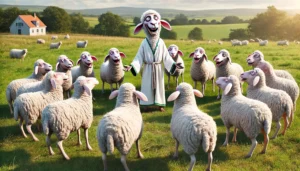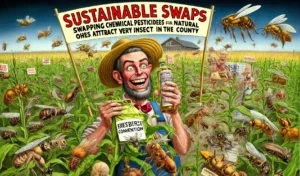
FarmerCowboy.com A humorous illustration of a traditional Indian farmer looking confused while a drone hovers above his field scattering Farming Alan Nafzger 1.webp.webp
National Agriculture Science Center of India: Farming Meets Science, and the Goats Are Confused
When Science Takes Over the Fields
Drones, Data, and the Quest for the Perfect Cow
In the heart of India’s efforts to revolutionize agriculture lies the National Agriculture Science Center, a place where science meets soil and the occasional goat wanders into a laboratory. With a mission to promote sustainable farming, enhance productivity, and improve rural livelihoods, the center has brought together scientists, farmers, and technology in what can only be described as a complex relationship. Let’s explore the quirks, questions, and undeniable charm of this ambitious project.
NASC: Farming, Now With PowerPoint Presentations
Farmers across India have heard the buzzwords: “sustainability,” “resilience,” and “productivity.” What they didn’t expect was to see these concepts explained through endless PowerPoint slides at village meetings. One farmer from Punjab chuckled, “Who knew the solution to our problems was hidden in a pie chart?”
Reports suggest that training sessions often include more acronyms than actual seeds, leaving farmers scratching their heads. However, proponents argue that this knowledge-sharing is essential. A local scientist defended the approach: “You can’t expect farmers to embrace drone technology without first explaining airspace regulations.”
Resilience: Surviving Both Droughts and Bureaucracy
When the center talks about building resilience, it’s not just about climate change. It’s also about surviving the mountains of government paperwork that come with new initiatives. Farmers in Maharashtra joked that applying for subsidies felt like taking an entrance exam for an engineering college.
One agricultural officer explained the importance of resilience training: “We’re teaching crops to survive droughts and floods, but we’re also preparing farmers to survive red tape.” The irony, of course, is that the weeds in the research fields seem to thrive without any guidance at all.
Drones: Spooking Cows Nationwide
The center’s push for modern technology has led to the introduction of drones for crop monitoring. While this sounds futuristic, the practical implementation has been less than smooth. Farmers have reported cows looking nervously at the buzzing machines overhead. One herder exclaimed, “The cows think it’s some kind of flying snake! They’re ready to stampede.”
Despite the initial hiccups, drone advocates highlight their usefulness. Crop yields have reportedly improved in areas where drone technology is actively used. Still, a farmer in Gujarat summed up the skepticism: “I’ll trust the drones when they start milking the cows too.”
NASC: Productivity Apps and Tea Break Timers
In an unexpected twist, the center has also introduced productivity apps designed to help farmers manage their time better. One popular feature is a tea break timer, which has become an unlikely hit among rural communities. Farmers in Tamil Nadu joked that the app doesn’t just manage time; it also decides when the kettle goes on.
The app’s other features, such as weather forecasting and pest alerts, have received mixed reviews. A farmer noted, “It told me about pests, but it didn’t tell me how to stop my neighbor’s goat from eating my crops.”
Gene Editing and Goats With Questions
Scientific advancements like gene editing have sparked both excitement and confusion. In one village, farmers attended a seminar only to leave wondering if their cows were about to become genetically modified. A farmer quipped, “If it means fewer flies, maybe it’s worth it.”
The center’s scientists insist these techniques will revolutionize agriculture, but they admit that explaining concepts like CRISPR to a rural audience has its challenges. One researcher joked, “Sometimes I think the goats understand it better than the humans.”
NASC: Soil Samples Smarter Than Fertilizer Salespeople
The center’s labs are renowned for their cutting-edge technology. Soil samples are analyzed with such precision that they’ve earned nicknames like “PhD Dirt.” One farmer who visited the facility joked, “The soil here knows more about my farm than I do.”
These advances have led to tailored fertilizer recommendations, which have improved crop yields. However, the farmers still joke about the tech-savvy soil. “Next thing you know, it’ll start giving us weather updates,” one said.
Resilience for Crops and Critiques
The center’s efforts to make crops more resilient have faced scrutiny. Critics argue that some experiments focus too much on theory and not enough on practical results. A farmer’s complaint summarized the sentiment: “The crops are resilient, but what about us? We’re the ones dealing with the bills.”
Despite the criticism, there have been notable successes, including drought-resistant rice varieties. Scientists are optimistic about scaling these breakthroughs, even if the occasional goat eats a prototype.
NASC: The Goat’s Great Escape
One of the more humorous incidents at the center involved a goat infiltrating a research plot and eating experimental plants. Researchers described it as an “unintentional stress test.” The goat, however, seemed unbothered by the data it had digested.
Farmers joked that the goat’s actions were an act of protest against overcomplicating agriculture. One observer quipped, “It’s sustainable farming, but only if you’re a goat.”
Science Meets Bollywood
Farmers have noticed that their crops are now getting more attention than Bollywood celebrities. Local headlines have celebrated breakthroughs with the same enthusiasm usually reserved for movie stars. One farmer remarked, “My rice is more famous than I am.”
The attention is part of the center’s effort to popularize scientific farming methods. Whether it’s working or just creating celebrity crops is still up for debate.
Cows on Strike
As technology infiltrates farming, even cows seem to be reacting. One herd reportedly stopped cooperating after drones were introduced nearby. Farmers joked that the cows were on strike, demanding equal treatment as tractors.
Although amusing, the situation highlighted the need for better integration of traditional and modern methods. A farmer commented, “The machines are smart, but the cows are smarter.”
NASC: Internet for Cows?
In a surprising twist, some villages now offer internet access for agricultural purposes, with farmers speculating about what’s next. “Will the cows get their own Wi-Fi?” one farmer laughed.
Jokes aside, the connectivity has improved access to information, helping farmers stay updated on weather, markets, and crop management. Still, the idea of internet-savvy cows remains a running gag.
Farming Tools With Software Updates
Gone are the days of simple tools. Today’s farming equipment often requires software updates, a development that has left many farmers puzzled. “When did plows start needing passwords?” one farmer exclaimed.
While the technology has undeniable benefits, the learning curve has been steep. Farmers are adjusting, albeit reluctantly, to their new tech-centric tools.
NASC: Climate Change Experts in the Village
Thanks to the center’s outreach, many farmers now know more about climate change than the average weather forecaster. One villager joked, “If you need a monsoon prediction, don’t ask the news. Ask my neighbor.”
This newfound knowledge has empowered communities to adapt their practices, although the road to full climate resilience remains long.
Conclusion: Progress, With a Side of Comedy
The National Agriculture Science Center of India is undoubtedly making strides in modernizing farming. However, its journey is also peppered with moments of confusion, humor, and the occasional goat rebellion. As one farmer summarized, “They’re teaching us science, but we’re teaching them how to keep up with goats.”
In the end, the blend of tradition and innovation is what makes this initiative both impactful and entertaining. Whether it’s drones, data, or tea timers, the future of Indian farming is shaping up to be as resilient as its farmers—and maybe even its goats.

National Agriculture Science Center of India
Here are 15 observations about the National Agriculture Science Center of India, highlighting its mission of sustainable farming, science, and improving rural livelihoods:
- “Who knew the solution to India’s farming woes was hidden in lab coats and PowerPoint presentations?”
- “They say the center’s motto is ‘sustainable agriculture,’ but to a farmer, it just sounds like fewer cows, more calculations.”
- “When the National Agriculture Science Center says ‘resilience,’ they mean teaching plants to survive both droughts and government paperwork.”
- “Bringing science to agriculture sounds great until you realize the cow is looking suspiciously at the drone flying overhead.”
- “The farmers were skeptical of all the technology until they saw the app for predicting tea breaks.”
- “Improving rural livelihoods? Sure. Just as soon as the villagers understand what ‘gene editing’ actually means.”
- “The center’s labs are so advanced, even the soil samples are smarter than your average fertilizer salesperson.”
- “They promised farmers resilience, but they didn’t mention resilience to having their crops critiqued by scientists.”
- “Sustainable agriculture is all fun and games until the local goat decides it’s sustainable to eat the research plot.”
- “Farmers here don’t just plant crops anymore—they plant hypotheses and harvest data.”
- “Science met farming, and the crops are now getting more attention than Bollywood celebrities.”
- “Enhancing productivity? Great idea—until the cows went on strike demanding equal treatment as tractors.”
- “The rural village is thriving; the farmers are happy, and the cows now have internet access. Truly, progress!”
- “When your farming tools start needing software updates, you know the National Agriculture Science Center is involved.”
- “Thanks to the center, India’s farmers now know more about climate change than most weather forecasters.”
Originally posted 2002-01-04 03:40:01.
Originally Published at FarmerCowboy.com
2025-01-04 11:32:01
Karl Hoffman is a distinguished agriculturalist with over four decades of experience in sustainable farming practices. He holds a Ph.D. in Agronomy from Cornell University and has made significant contributions as a professor at Iowa State University. Hoffman’s groundbreaking research on integrated pest management and soil health has revolutionized modern agriculture. As a respected farm journalist, his column “Field Notes with Karl Hoffman” and his blog “The Modern Farmer” provide insightful, practical advice to a global audience. Hoffman’s work with the USDA and the United Nations FAO has enhanced food security worldwide. His awards include the USDA’s Distinguished Service Award and the World Food Prize, reflecting his profound impact on agriculture and sustainability.



